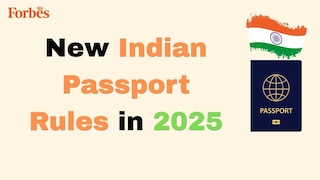New passport rules explained: From mandatory birth certificate to new colour-cod...
Know all the latest changes in the Indian passport regulations for 2025 and understand how they impact your travel and application processes


Every year, millions of Indians apply for a passport to explore global opportunities for work, education, or travel. According to Passport Seva"s latest data, over 3 lakh applications were processed last week alone (the second week of March 2025), with more than 2.5 lakh passports issued—a clear reflection of the increasing demand for hassle-free travel.
However, 2025 has brought significant changes to Indian passport regulations. If you plan to apply for a new passport or renew an existing one, it"s essential to understand these new rules. From digitisation to revised documentation requirements, these new passport regulations aim to enhance security and transparency and simplify applications for everyone.
In this post, we’ll discuss everything you need to know about the latest updates to your Indian passport process.
The passport rules on date of birth have remained unchanged for many years, mainly because many rural residents lack birth certificates. However, with stricter law enforcement, mandatory birth certificates will standardise the passport application process and reduce the risk of fake documentation.
For those born before October 1, 2023, alternative documents such as school leaving certificates, PAN cards, driving licenses, voter ID, or attested service records can still be used to apply for a fresh Indian passport or renewal.
This new passport rule helps prevent identity theft, fraud, or privacy risks while travelling and is an impactful shift that indicates how passports are evolving digitally.
The decision is backed by the Memorandum of Understanding (MoU) between the Ministry of External Affairs (MEA) and the Department of Posts, which will streamline all passport services under Passport Seva. The goal is to process applications faster, maintain uniformity, and provide a smoother experience for everyone under the latest passport regulations.
India issues four types of passports: Ordinary passports for citizens, Official passports for government servants, Diplomatic passports for diplomats and high-ranking officials, and Emergency passports for Indian citizens who are in distress or emergency situations abroad.
Which is the world’s most powerful passport in terms of accessibility?
According to Hanley and Partners’ 2025 report, the Singapore passport is the most powerful passport globally, providing visa-free access to 193 countries. It is followed closely by Japan, South Korea, and Denmark.
Which countries allow visa-free travel for Indian passport holders?
Indian passport holders can travel visa-free to Nepal, Maldives, Kenya, Thailand, Indonesia, Qatar, and around fifty other countries. However, entry requirements may vary in each country, so it’s essential to cross-check all the details in advance.
First Published: Mar 28, 2025, 18:12
Subscribe Now